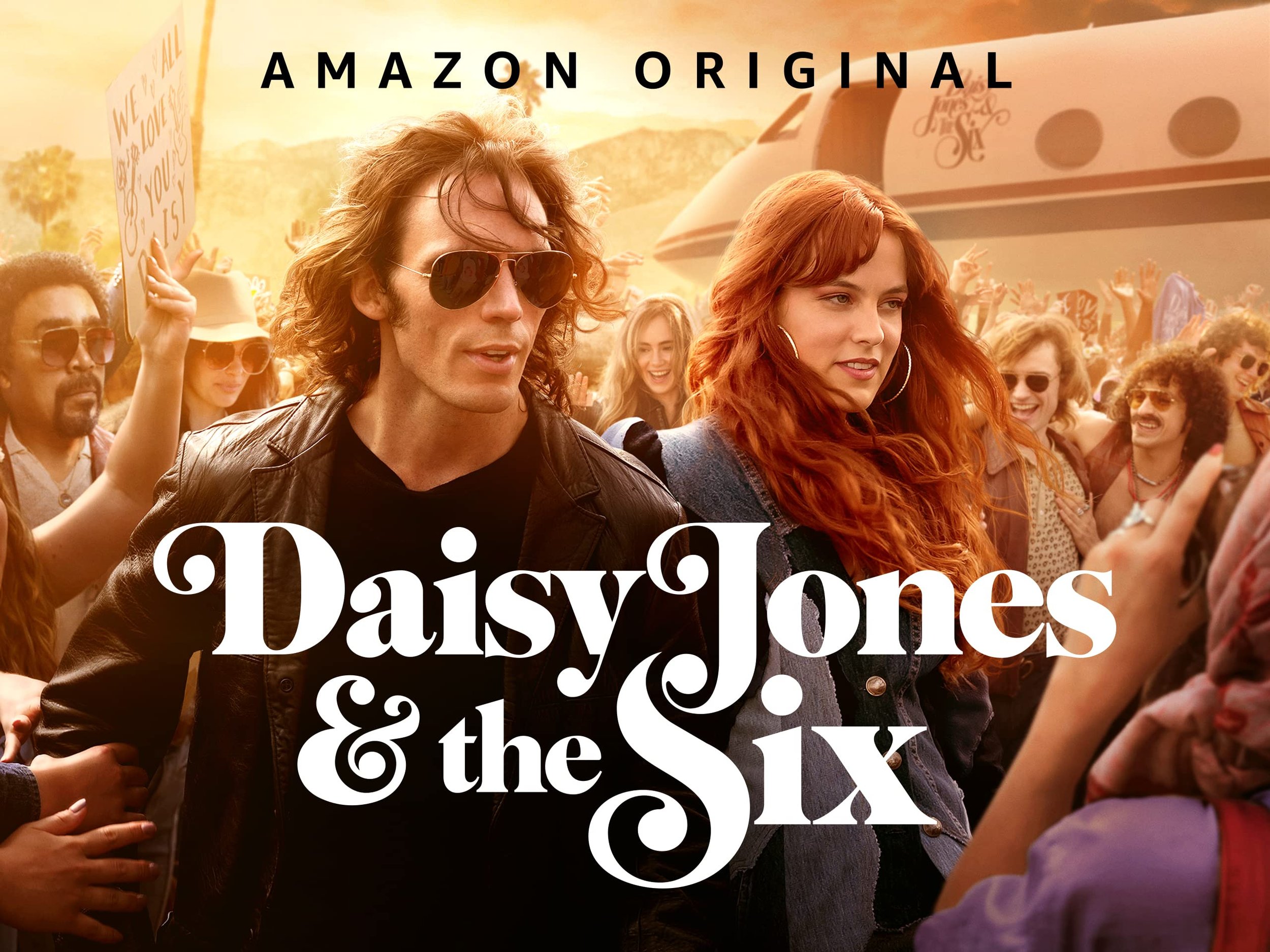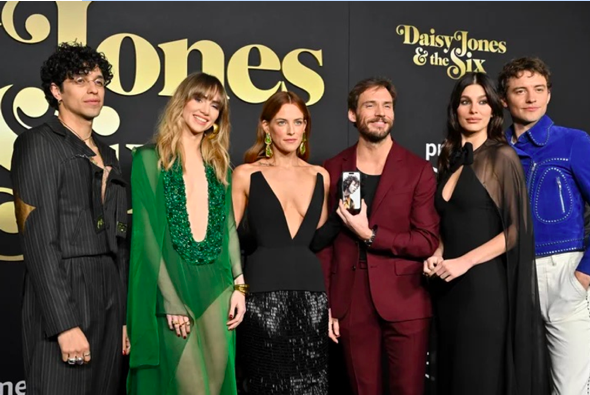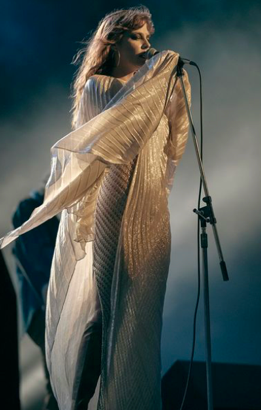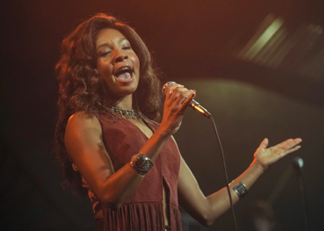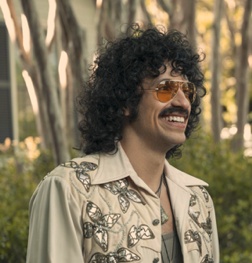“Daisy Jones And The Six” Is Actually A 9.
Don’t worry, I had all the same reservations you did when I started watching “Daisy Jones and the Six.” Was this just a 3.2 beer version of “Almost Famous” as a TV show? If the fictional Daisy Jones and the Six were based on Fleetwood Mac, would it work if the music wasn’t as good? Didn’t Cameron Crowe already try something like this with his “Roadies” series, and it flopped?
So, yeah, I was nervous going in.
Cut to about a week later when I found myself sobbing on my couch on a Sunday morning as I finished watching the final episode 10 of “Daisy Jones and the Six.”
If music is important to you, “Daisy Jones and the Six” is worth watching. In fact, it’s closer to a 9 than a six. Please note the caveat here: if music is important to you. With this series, you need to care about music. In other words, if people ask you what type of music you like, and your canned response is something like, “I like everything,” or worse yet you use the word “eclectic” at any point—you don’t really like music, and this show might not be for you.
By contrast, if lyrics matter to you. If a song that pops on the radio at just the right moment can act as a sort of real-time horoscope sent from the universe—we can work with that, go ahead and cue this bad boy up on the old Amazon Prime.
We provide this music-loving caveat because if it is nothing, “Daisy Jones and the Six” is a journey. And at times it can be an exhausting, and tumultuous one. It’s a genuine love of music that will be your throughline here, and if you have that—the conclusion will more than likely reward you with a tear-stained couch of your own.
So why is “Daisy Jones and the Six” a 9? Let’s count the ways:
1. This series is a treasure trove of future acting superstars.
Austin Butler may have won an Oscar for his portrayal of Elvis, but the King’s actual granddaughter, Riley Keough, who plays Daisy Jones is far more spectacular in the lead here than Butler was doing the Elvis impression that netted him a statuette.
And while Keough is indeed the breakout performer, she is not alone. Camilla Morrone may have emerged on the scene as one of Leo DiCaprio’s girlfriends, but based on her performance as Camila Dunne, Morrone’s acting career should go well past the tender age of 27 (when Leo usually breaks up with his girlfriends). Suki Waterhouse (Karen Sirko), Will Harrison (Graham Dunne) and many more are also great in this ensemble cast. We expect “Daisy Jones and the Six” to eventually be like one of those classic films (e.g. “Dazed and Confused,” “The Outsiders”) where years later you can go back and pick out a half dozen stars who at the time were up-and-comers.
2) TJR—a fresh, female Rockstar writer.
“Daisy Jones and the Six” was written by Taylor Jenkins Reid whose most recent novel completes her “famous women quartet.” It’s no small thing that “Daisy Jones and the Six” feels like a Cameron Crowe project, as TJR’s words add emotional depth throughout the series. Note: We are referring to Taylor Jenkins Reid here and throughout the rest of this article as TJR, because she feels like precisely that type of badass.
There were numerous times while watching “Daisy Jones and the Six” that I wished I had a pen and paper to catch a gem of a line from TJR. Luckily, there were more than a few websites to do the job for me (these are pulled from the book):
https://bookriot.com/daisy-jones-and-the-six-quotes/
A couple lines that stood out for me:
“History is what you did, not what you almost did, not what you thought about doing. And I was proud of what I did.”
“I had absolutely no interest in being somebody else’s muse.
I am not a muse.
I am the somebody.”
“Men often think they deserve a sticker for treating women like people.”
“That’s the glory of being a man. An ugly face isn’t the end of you.”
In the ten-episode arc of “Daisy Jones and the Six” there are probably another hundred quotes worthy of being cross stitched onto a throw pillow in your cool apartment. TJR is an emerging rock star as a writer, importantly writing from a female point of view. Her words leap off the screen, and we eagerly await her next project. It won’t be small.
3) Death Valley Deep.
With apologies to Tom Cruise who saved the movies until we only went to his movie, why did it take us so long to figure out that ten episodes of a television series is 1,000 times better for character development than 2 hours on the silver screen?
There are more love triangles in “Daisy Jones and the 6” than a Tri-Delt Spring formal— and the show does a masterful job of making you care about each and every one of the characters. Even plot lines that seem like an appendage at the start (e.g. Daisy’s disco friend Simone) eventually interweave so that every ounce of the series has real depth via character development.
Part of this is the result of the format of the show which is constantly cutting between present day and flashbacks to tell the story which has the cumulative effect of making every character somehow more real. Some credit for this device should be given to Scott Neustadter and Michael H. Weber, the writing tandem that helped bring TJR’s best-selling novel to television. Usually when you see that adapted for television writing credit in the opening titles it’s not such a big deal, but the choices made in how to tell the “Daisy Jones and the Six” story are part of what makes it great. So much so that I might have to go watch “The Fault in our Stars” and “The Spectacular Now” from Neustadter and Weber next.
4) As Un-Hollywood as Hollywood gets.
While “Daisy Jones and the Six” is littered with Hollywood rock clubs like the Troubadour, the plot line of the show is anything but Hollywood. In fact, I’d dare you to try to predict the plot of “Daisy Jones and the Six” starting with Daisy Jones herself. No one tells Daisy what to do, and the twist and turns of this ten-episode series are equally as unpredictable which is refreshing, if not exhausting. Without giving away any spoilers, all I’d say is stick with the series as it will keep surprising you, in a good way.
5) The music is good . . . enough.
Critics of “Daisy Jones and the Six” will say that the music wasn’t quite as strong as it should have been to make the story and the passion of the characters believable. If people are going to be this tortured, shouldn’t they be making “Rumors” or “Revolver?” And while it’s true “Daisy Jones and the Six” lacks the star power of a track like “Shallow” from “A Star is Born,” the original music in the series gets better and better with each listen and understanding what these songs mean to the characters themselves. Having completed the series, it seems like the series would have been weaker had they decided to borrow from popular tracks (see “Tiny Dancer” bus scene in “Almost Famous.”). Not to mention, for a show that looks back fondly on the album-oriented rock of the 1970s, a soundtrack that’s “a grower” is perfectly matched to the era.
6) There is only one Billy Dunne.
While it’s clear Riley Keough is a runaway star in the role of Daisy Jones, her soulmate Billy Dunne played by Sam Claflin is a bit less clear. On the one hand, Claflin feels a bit like a Billy Crudup retread. At times he feels too old for the role, but then in the modern time interview clips he adds a striking emotional depth. The biggest compliment you can give Claflin is he’ll forever be Billy Dunne. He lands the plane, which is no easy task when your intertwined in a Daisy Jones’ double helix.
7) Timothy Olyphant and his mustache.
“Deadwood” and “Justified” vet Timothy Olyphant knows a thing or two about good television and great mustaches.
Olyphant is like a wonderful seafood tower in “Daisy Jones and the Six” playing the role of greasy tour manager Rod Reyes. His mustache alone make him a welcome Easter egg in this series. As an added bonus, due to the flashback device we get to see Olyphant’s mustache in multiple eras.
8) Band as Family.
Friendsgiving . . .the Sprint “Framily plan. . .” the idea of non-traditional families is not new. And while the idea of a band as a family may seem obvious at first blush, “Daisy Jones and the Six” is a dissertation on it. By the end of the ten episodes, it’s painfully clear that 23andMe has nothing on The Six, as blood may be thicker than water . . .but the right songs are thicker than both.
9) God Bless Drummers.
“Daisy Jones and the Six” is like an onion that keeps peeling, except for one beautiful character. Of course, it’s the drummer—Warren Rhodes, played brilliantly by Sebastian Chacon. If the entirety of “Daisy Jones and the Six” is an experiment, drummer Warren would be our control. Things are exactly what you see with the Six’s drummer. He’s in a big rock & roll band. He’s having fun. He’s dating a movie star. And he’s happy, period. No shadows. No secrets. Considering how tortured the rest of the story and characters are, every time Rhodes comes on screen he’s a breath of fresh air, and a reminder we should all be a drummer in our next life.
In closing, you may ask why not give “Daisy Jones and the Six” a ten?Or perhaps, an even more “Spinal Tap” score of eleven? Well, if “Daisy Jones and the Six” teaches us anything, it’s that nothing is perfect, it just needs to be true. It needs to be real. It would be a disservice to “Daisy Jones and the Six” to give it a perfect score as this series shows us the beauty of truth . . .as opposed to the idea or image of something. There’s no such thing as a ten in the world of “Daisy Jones and the Six.” Everyone has a secret, or a story—but in the end this series adds up to a lot more than six. If you haven’t watched, buckle up. And don’t forget to grab a pen, notebook, and some tissues.

